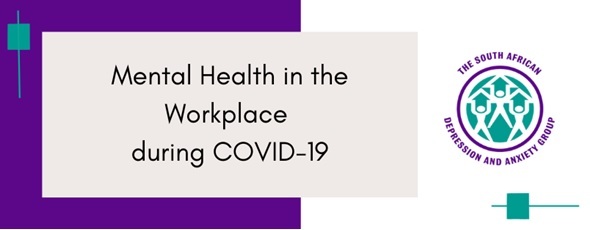
At the beginning of the COVID-19 pandemic, many individuals experienced an increase in Anxiety fearing a COVID-19 infection and the uncertainty of how the pandemic would influence daily life.
Anxieties were further fuelled by being urged to stay inside as the national lockdown came into effect. As we slowly became accustomed to life in lockdown, anxieties subsided somewhat as we
accepted a new reality of living.
Many people across South Africa are now able to return to a working day at the office, but what does this mean? Uncertainty is now again causing an increase in anxiety because a new norm and a new reality of life at work needs to be implemented once again.
It’s now more important than ever, that companies, employers and employees make their own Mental Health, and the Mental Health of others within the workplace, a priority.
Individuals going back to work may feel an increase in feelings of Anxiety, Depression and fear because the physicality of a workplace does not merely entail an office at the end of the passage anymore, but in some cases, an entire building full of other individuals.
Business for South Africa (B4SA) partnered with SADAG and PsySSA to provide businesses with Mental Health support and guidelines for mental health during COVID19.
SADAG Corporate Webinar - Mental Health in the SA Workplace Webinar (6 August 2020)
- Ina Rothmann SADAG Corporate Webinae - Click Here
- Prof Stoffel Presentation - Click Here
- COVID-19 and Employee Mental Health: The reality behind the rhetoric - Click Here
- Live Recording Video - Click Here
Guidelines for Mental Health in the Workplace during COVID-19:
Business for South Africa (B4SA) partnered with SADAG and PsySSA to provide businesses with Mental Health support and guidelines for mental health during COVID19.
- To view the B4SA Mental Health for Business Briefing Webinar Recording - Click Here
- SADAG’s Guidelines for Business on Mental Health in the Workplace during COVID19 - Click Here
Relevant Press and Media Articles:
- Read the Daily Maverick Article on the levels of stress South African Employees are experiencing - Click Here
- Read the Headtopics article on how South African Employees are at risk of developing Pre-TSD - Click Here
- Read the 94.7 article explain new research on South African Employees - Click Here
- Read the 94.7 article on Pre-tsd and south African employees - Click Here
- Read the spotlight article on the high levels of stress employees are facing - Click Here
- Read the FAnews article on the psychological impact of COVID-19 and how to stay healthy from the waist up - Click Here
Helpful Podcasts and other Online Resources:
As we navigate our way through these difficult times, it has become clear that the mental challenges we face are common and the call for mental health support has increased exponentially. One of the positive things about this pandemic is that expert advice has become so much easily accessible. Experts give advice that could help you navigate these difficult times more effectively and successfully across multiple realms of current day living. Explore the links below for more info.
- Radio 702 have released various podcasts on How to Win at work and at Life during COVID-19 with Nikki Bush - Click Here
- Radio 702: World of Work: Managing toxic environment and individuals in the workplace with guest, Dawn Klatzko, who is a Business and Executive Coach - Click Here
- Discovery have also released various podcasts on living life during the COVID-19 pandemic. Click here to listen to various topics on employees, employers and workplace circumstances here
- SADAG have released Helpful Tips to Manage Your Stress and Anxiety During This Time - Click Here
- Also see SADAG’s guidelines on Living with A Mental Illness and Coping During Covid-19 - Click Here
- MIND UK - Mental Health at Work Commitment guide for employers during coronavirus - Click Here
SADAG provides FREE telephonic counselling, support, information and nationwide referrals to Support Groups, Psychologists, Psychiatrists, Clinics and more. Online resources such as brochures, articles and self-help videos can be found at www.sadag.org.
To speak to a counsellor, call 0800 21 22 23 (7 days a week, 365 days a year, 8am - 8pm).
Helpful Tips To Manage Your Stress And Anxiety During This Time
- Maintain a daily routine as much as possible – get up, get dressed, create a to-do list, etc.
- Reduce the time you and your family spend watching or listening to media coverage – filter what you are watching, reading and listening to. Don’t have the radio or news channel playing on in the background at home. Learn what you can from these respected sources. Only check these sites at specific times of the day. For example at 8am, 1pm and 9pm.
- Yes, the situation is frightening, it’s frustrating, and you feel out of control. Acknowledge that and allow yourself specific time to sit with those feelings – and then make sure you focus more time on the things you can control and do. Create a list of things to do to keep yourself busy and active – even during social isolation. Make a list that you can stick up on the fridge or in your bedroom, make it public so the whole family can add ideas (such as reading books you haven’t been able to get to for months, gardening, watching your favourite movies, do something creative like painting, drawing, poetry, listening to your favourite music, trying a new exercise at home, cleaning out the cupboards that you have been avoiding to do for months, etc.). When you run out of ideas – ask your friends and family for ideas. Do small things every day that you enjoy and help lift your mood.
- If you take medicine every month, speak to your medical scheme and pharmacist to get scripts filled in advance or arrange for home delivery.
- If you are really struggling to cope with the situation, don’t be afraid to speak up. Call SADAG, talk to your therapist, create a WhatApp or Facebook support group. Stay connected with people via technology – do more video calls, phone friends to catch up, etc.
- Mute key words which might be triggering on Twitter, unfollow or mute accounts, mute WhatsApp groups and hide Facebook posts and feeds if you find them too overwhelming
- Thinking positively during a crisis is easier said than done. One of the best ways to ground yourself is in fact, in science. Avoid watching or reading news or social media, especially fake news, where facts can become blurred and exaggerated. Listen to what acknowledged experts are saying about the virus. SADAG suggests only following reliable resources such as: www.cdc.gov/coronavirus/2019-nCoV, www.who.int/emergencies/diseases/novel-coronavirus-2019, www.sacoronavirus.co.za and National Department of Health Whatsapp 060 012 3456
- Discuss with family, friends and neighbours what you can do to protect yourselves and be there for each other. Draw up a plan and keep it visible.
- Ask yourself what you can control – your attitude, your thinking, your home, caring for your body and mind. Focus on these things.
- Make it a part of your daily routine to reach out to friends and family. Having a sense of connection and a feeling of community is essential for hope and healing.
- Read this article for 10 Quarantine-Friendly things to do during a Coronavirus home isolation.
- Practice relaxation techniques to ease stress levels & help your immune system.
- More ideas of Things to do whilst self-isolating.
- 'Social connection remains so important': Psychologist shares tips on coping with coronavirus anxiety. Read more in an article by News24. - Click here
- How to identify the stages of grief in COVID-19 messages - Click here

























